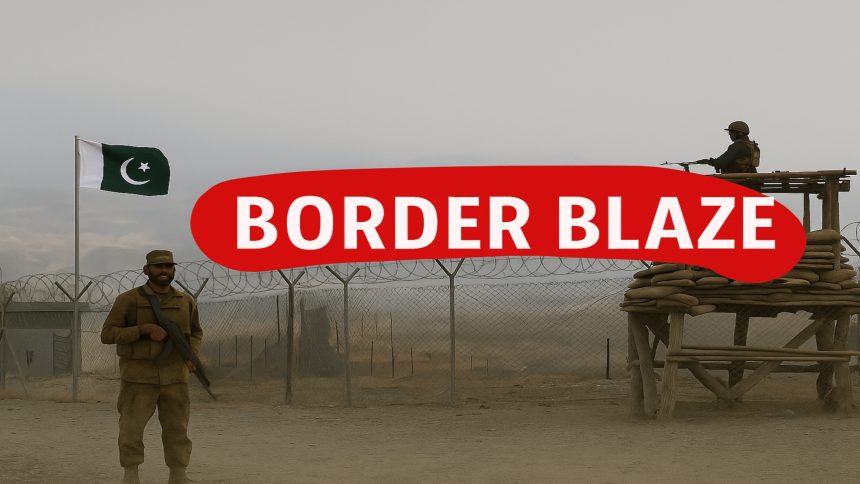By | Arvind Jadhav
🟡 Escalation Along the Durand Line
New Delhi: Tensions between Pakistan and Afghanistan have reached a breaking point after a series of deadly border clashes that erupted over the weekend. Both countries are blaming each other for initiating attacks, as heavy gunfire and artillery exchanges were reported along multiple stretches of the Durand Line. This confrontation marks one of the most serious escalations since the Taliban took power in Kabul in 2021.
According to Afghan officials, at least 58 Pakistani soldiers were killed during overnight operations on Saturday. However, Pakistan has confirmed 23 casualties among its troops and claims that its forces retaliated strongly, killing more than 200 Taliban and affiliated fighters while destroying several Afghan border posts. Independent verification of these claims remains difficult due to restricted access in the conflict zones.
🟡 Borders Closed, Trade at a Standstill
In the aftermath of the violence, Pakistan has sealed all major border crossings with Afghanistan — including Torkham, Chaman, Kharlachi, Angoor Adda, and Ghulam Khan. This move has brought cross-border trade to a grinding halt, leaving hundreds of vehicles stranded on both sides. Traders and civilians have been caught in the standoff, with essential goods and humanitarian supplies stuck for days.
The Torkham and Chaman crossings, lifelines for bilateral commerce, remain closed as of Tuesday. Officials say the closures will continue until security conditions improve, though no formal reopening timeline has been announced. The disruption is expected to heavily impact both economies, especially Afghanistan, which depends on Pakistan for key imports.
🟡 Military on High Alert
Pakistan’s military has been placed on high alert across its western frontier, reinforcing checkpoints and deploying additional troops. Islamabad claims it is responding to “provocations” by Afghan forces and attacks orchestrated by militants operating from Afghan soil. In retaliation, Pakistani forces have reportedly used artillery fire to destroy border installations allegedly used by Taliban units.
Meanwhile, Afghanistan’s Taliban government has rejected Pakistan’s accusations, insisting that its forces acted in self-defense. Kabul’s authorities accuse Pakistan of conducting airstrikes inside Afghan territory earlier this month — actions they call violations of sovereignty.
🟡 Diplomatic War of Words
As the border remains tense, diplomatic relations between Islamabad and Kabul have deteriorated rapidly. Afghan Foreign Minister Amir Khan Muttaqi stated that Afghanistan seeks peace but will not tolerate repeated attacks. “If Pakistan continues aggression, we have other options,” he warned in a televised statement.
Pakistan’s Prime Minister Shehbaz Sharif responded by condemning what he termed “unprovoked Afghan aggression” and vowed to protect Pakistan’s sovereignty “at any cost.” Both nations have called back several border-level delegations, effectively halting dialogue for now.
🟡 Regional and Global Reactions
The unfolding border crisis has alarmed regional and global observers. Gulf countries including Qatar and Saudi Arabia, as well as the United Nations, have urged both sides to exercise restraint and engage through diplomatic channels. Analysts warn that if the situation worsens, it could destabilize an already fragile regional security balance, particularly as militant activity linked to the Tehreek-e-Taliban Pakistan (TTP) increases.
🟡 Humanitarian Fallout
The border closure has led to growing humanitarian concerns. Thousands of truck drivers, traders, and daily wage laborers are stranded with limited access to food and shelter. Afghan refugees, many of whom depend on cross-border movement, have been directly affected. Aid groups fear that prolonged closure could worsen food shortages in eastern Afghanistan, where supply chains rely heavily on goods from Pakistan.
🟡 Background and Root Causes
The crisis is rooted in decades-old tension over the Durand Line, the disputed border drawn during British rule. Pakistan has long accused Afghanistan of harboring TTP militants, who have carried out deadly attacks inside Pakistani territory. The Taliban government in Kabul denies these claims, alleging that Pakistan’s military often violates Afghan airspace under the pretext of counterterrorism operations.
🟡 What Lies Ahead
With both militaries on alert and no formal ceasefire in place, fears of renewed clashes persist. Diplomatic channels remain under pressure to broker peace before the standoff spirals further. Experts say international mediation — possibly by Gulf states or China — may be the only path to avoid another full-scale border conflict.
For now, the Pakistan–Afghanistan border remains a flashpoint, symbolizing not only regional insecurity but also the deep mistrust that continues to define relations between the two neighboring nations.








